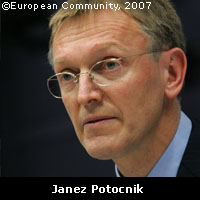Potocnik predicts major shake-up of European research
The changes proposed in the recently published Green Paper on the European Research Area (ERA) should lead to a much-needed shake-up to the system, believes EU Science and Research Commissioner Janez Potocnik. Speaking at an informal meeting of the Competitiveness Council on 26 April, the Commissioner said that the changes, if successfully introduced, could very well see a new 'fifth freedom' within the EU - that of the 'movement of knowledge'. This would complement the four freedoms enshrined in the Treaty, protecting the free movement of goods, services, capital and labour. He said he hoped to see this fifth freedom spread to other areas and policies than purely research, but which have a big impact on research. 'For example, could we not start imagining a social security system dedicated to the needs of researchers?' he asked. But the key question is how to create this freedom. European research is currently suffering from a number of problems, the most significant being the fragmentation of resources, a weak global presence, research gaps, duplication of excellence and obstacles to a career in research. 'A true European Research Area cannot function under such conditions,' warned the Commissioner. He pointed to the need for two central changes: the first is a practical one - the need to break down barriers to research. 'For example, why are researchers prevented from being completely mobile in all EU countries and sectors due to questionable administrative requirements?' he asked. The second change is more in attitude. 'We need a greater understanding that national interest coincides with European interest. We need to embrace an attitude which sees Europe come first,' argued Mr Potocnik. 'We have to understand that joining forces and acting as a United States of Research will make us all better off. 'The reason is simple: our economies and societies are so intimately interconnected that a gain for one of us often constitutes a gain for all of us,' he added. Published on 4 April, the Green Paper entitled 'The European Research Area: New Perspectives', outlines what is needed to introduce this 'fifth freedom'. Its vision revolves around the need to pool forces by specialising more and by letting clusters of global excellence emerge, which could be achieved through a process of joint programming and evaluation of research. This process would also be coupled with a fluid sharing of knowledge and a seamless mobility of researchers, who would be attracted by research institutions that compete and cooperate at European level, and that have access to world class research infrastructures. 'This would be a Europe of research that is open to the world and able to take responsible global leadership in science,' noted the Commissioner. Mr Potocnik said he was eager to find out whether the vision laid out in the Green Paper was shared by ministers at the meeting, and whether they also believed that a debate on the subject in their countries would be of benefit. 'I cannot emphasise enough how important it is that you play an active role,' he said. 'We are standing at a key point in our development. These are times when brave decisions are needed - and they are needed now. I am really afraid that we don't have the luxury of time,' said the Commissioner. 'What you sow today takes a long time to come to fruition. But if you don't sow today, you won't have any fruit.'

